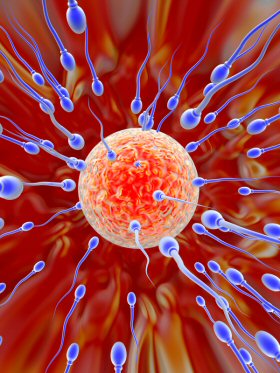 Compared to egg donors, sperm donors are paid less for a much longer time commitment and a great deal of personal inconvenience. That's the conclusion from a study into the topsy-turvy market for reproductive services that often defies not just conventional wisdom, but also the basic law of supply and demand.
Compared to egg donors, sperm donors are paid less for a much longer time commitment and a great deal of personal inconvenience. That's the conclusion from a study into the topsy-turvy market for reproductive services that often defies not just conventional wisdom, but also the basic law of supply and demand. Sociologist Rene Almeling's investigation into the operations of U.S. sperm banks and egg agencies found that discrepancies in compensation rates for the building blocks of assisted reproduction could not be explained by either market forces or the biological differences between female egg donors and their male counterparts.
"From compensation rates to the smallest details of donor relations, sperm donors are less valued than egg donors," Almeling explained. "Egg donors are treated like gold, while sperm donors are perceived as a dime a dozen. Women, meanwhile, are not only paid more for a much shorter time commitment, they are repeatedly thanked for 'giving the gift of life'."
The study, appearing in American Sociological Review, notes that while the supply of egg donors far outstrips recipient demand, suitable sperm donors are quite rare. In fact, only a tiny fraction of the male population possesses a sperm count consistently high enough to be considered donation-worthy, and more than 90 percent of sperm bank applicants are rejected for this and other reasons.
But market forces appear to have little effect in the real world of fertility clinics. "A pronounced double-standard exists in the way that men and women donors are valued by the fertility industry," Almeling said. "Based on the availability of donors alone, you would expect the abundance of potential egg donors to drive down compensation fees and the scarcity of potential sperm donors to drive up their fees. But I found just the opposite."
The findings show that it is not unusual for egg donors to make upwards of $5,000 per donation - no matter the outcome.
Agencies also encourage recipient couples to provide female donors with thank-you notes, small tokens of appreciation and even cash bonuses. In contrast, sperm banks do not pay as well or encourage such displays of gratitude. Male donors make between $50 and $75 per donation, and they are paid only when their samples meet the high fertility standards required for freezing.
The "working" conditions for male donors are also vastly different. In addition to requiring weekly donations for a year, sperm banks instruct men to refrain from sex for two days prior to donation or risk the possibility that their samples will fail to meet fertility standards. Additionally, Almeling found that women were repeatedly reminded of their generosity, whereas men tended to be reminded that sperm donation was to be viewed like any other job.
Clinics justify the compensation rates for egg donors by pointing out that egg extraction is more difficult and risky than extracting sperm and that the female body has a limited supply of eggs, while the male body replenishes sperm. But Almeling does not believe these biological differences fully explain this market. While an individual woman has fewer eggs than an individual man has sperm, women never run the risk of "running out" of eggs due to donating. Moreover, the huge oversupply of women willing to be donors means that eggs are not actually scarce for couples seeing to acquire them.
"Both eggs and egg donors are more highly valued than sperm and sperm donors, where it is not just reproductive material but visions of middle-class, American femininity and masculinity and motherhood and fatherhood that are marketed and purchased," said Almeling, citing how the application process for donors reinforces "gendered stereotypes of selfless motherhood and distant fatherhood."
"While most egg donors will never meet their genetic children, women are expected to reproduce well-worn patters of 'naturally' caring, helpful femininity, guiltily hiding any interest that they might have in the promise of thousands of dollars," Almeling said. "This ruse is not demanded of sperm donors. Men, who are more likely to be contacted through the banks' identity release programs, often do not even consider that children will result from regular deposits at the sperm bank." In fact, one sperm donor was dumbstruck when he was informed that one of his contributions had resulted in conception. "I hadn't really thought about the fact there were going to be pregnancies," he exclaimed.
Related articles:
Paternity Testing A "Guy Thing"
Sperm Banks In Need Of Makeover, Says Fertility Expert
Source: American Sociological Association

